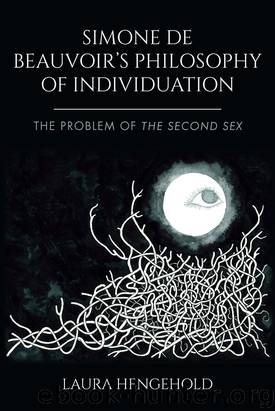Simone De Beauvoir's Philosophy of Individuation by Laura Hengehold

Author:Laura Hengehold
Language: eng
Format: epub
Publisher: Edinburgh University Press
Notes
1.‘And therefore, if the earlier forms of society are natural, so is the state, for it is the end of them, and the nature of a thing is its end. For what each thing is when fully developed, we call its nature, whether we are speaking of a man, a horse, or a family. Besides, the final cause and end of a thing is the best, and to be self-sufficing is the end and the best’ (Aristotle Politics, book 1, chapter 2, 1252b30).
2.Aristotle, Metaphysics book 7, chapter 8; see also Of Generation and Corruption.
3.See their account of stratification in chapter 3, ‘10,000 B.C.: The Geology of Morals’ and of the machinic phylum in chapter 12, ‘1227: Treatise on Nomadology’ (TP 40–5, 408–15/54–60, 507–17).
4.In ‘Pyrrhus and Cineas’, Beauvoir uses the metaphor of an arch whose stones support one another without pillars. See Beauvoir, ‘Pyrrhus and Cineas’ (PC), 140/367.
5.Hughes, Deleuze’s Difference and Repetition 44–5.
6.Natanson, Anonymity, 25–9; Arendt, The Human Condition, 179.
7.‘In all these cases power is always the object of a representation, of a recognition which materially presupposes a comparison of consciousnesses (Deleuze, Nietzsche and Philosophy, 80).
8.For example, Foucault, ‘Truth and Power’, 120.
9.Deleuze, Cinema 2, 170–2, 182.
10.See Parker, ‘Singularity in Beauvoir’s The Ethics of Ambiguity’.
11.Holveck, Philosophy of Lived Experience, 69.
12.Hegel, Phenomenology of Spirit, §670, p. 408.
13.Simondon, L’Individuation Psychique et Collective (IPC), 27. All translations from Simondon are mine.
14.Hughes, Deleuze’s Difference and Repetition, 27–8.
15.Bauer, too, suspects that the notion of recognition attributed to Hegel is not exactly Hegelian. Bauer, Simone de Beauvoir, Philosophy, and Feminism, 83–4.
16.For both Kierkegaard and Heidegger, the ‘they’ of public opinion endangers an individual’s relationship to him or herself, and in Kierkegaard’s case, to faith and religion. Concern for the opinion of others tends to make us avoid a personal destiny. Kierkegaard, ‘The Modern Age’, in Two Ages; Heidegger, Being and Time, 164–8.
17.See also her comment in ‘Moral Idealism and Political Realism’, ‘If man’s good is constituted by the élan of human transcendence, and if the result forms a single process with the movement leading to it, then it becomes impossible to disassociate the end from the means’ (184).
18.We should probably regard this as an example of consciousness as being for-itself interrupting society as an example of being in-itself by imposing its own interpretations and temporality.
19.Recall from Chapter 2: ‘Our projection of our psychic states into space in order to form a discrete multiplicity is likely to influence these states themselves and to give them in reflective consciousness a new form, which immediate perception did not attribute to them’ (Bergson, TFW 90).
20.In her review of The Phenomenology of Perception, Beauvoir contrasts Sartre’s ‘nihilating power of the mind’ to Merleau-Ponty’s belief that ‘our existence never grasps itself in its nakedness but as it is expressed by our body. And this body is not enclosed in the instant but implies an entire history, and even a prehistory’ (Beauvoir, ‘Review of The Phenomenology of Perception’, 163).
21.When Husserl speaks about the unity of ‘immanent time’ combining a variety of protentions and retentions in
Download
This site does not store any files on its server. We only index and link to content provided by other sites. Please contact the content providers to delete copyright contents if any and email us, we'll remove relevant links or contents immediately.
The remains of the day by Kazuo Ishiguro(8975)
Tools of Titans by Timothy Ferriss(8365)
Giovanni's Room by James Baldwin(7326)
The Black Swan by Nassim Nicholas Taleb(7107)
Inner Engineering: A Yogi's Guide to Joy by Sadhguru(6785)
The Way of Zen by Alan W. Watts(6600)
Asking the Right Questions: A Guide to Critical Thinking by M. Neil Browne & Stuart M. Keeley(5759)
The Power of Now: A Guide to Spiritual Enlightenment by Eckhart Tolle(5752)
The Six Wives Of Henry VIII (WOMEN IN HISTORY) by Fraser Antonia(5497)
Astrophysics for People in a Hurry by Neil DeGrasse Tyson(5182)
Housekeeping by Marilynne Robinson(4436)
12 Rules for Life by Jordan B. Peterson(4299)
Double Down (Diary of a Wimpy Kid Book 11) by Jeff Kinney(4261)
Ikigai by Héctor García & Francesc Miralles(4246)
The Ethical Slut by Janet W. Hardy(4242)
Skin in the Game by Nassim Nicholas Taleb(4239)
The Art of Happiness by The Dalai Lama(4125)
Skin in the Game: Hidden Asymmetries in Daily Life by Nassim Nicholas Taleb(3989)
Walking by Henry David Thoreau(3953)
